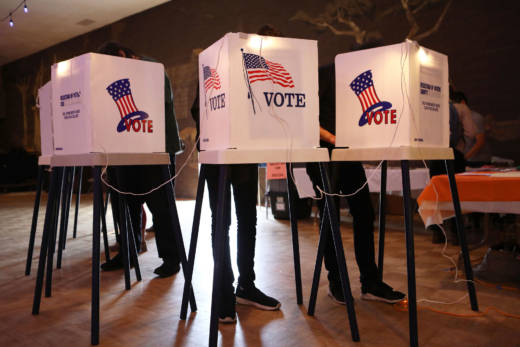If you want to vote in the Democratic, Libertarian or American Independent Party primary by mail, you’ll need to return that postcard with your selection. (If you don’t, you’ll get a “non-partisan ballot” with no presidential candidates listed.) If you lost your postcard, get in touch with your county elections office, which can help get you a new one in time to vote.
If you want to vote in one of those three primaries in person on Election Day, no problem — just show up to your polling place and ask a poll worker for one of those ballots.
If you want to vote in the Republican, Green and Peace and Freedom Party primaries, you’ll need to re-register with that specific party.
“We encourage any voter who wants to be part of the process to nominate a Republican for president to register as a Republican,” said Jessica Millan Patterson, chair of the California Republican Party.
“We strongly believe it is the right and the duty of the Republican Party to follow a process that ensures that Republicans choose who will represent our party at the nominating convention and who is elected to our county central committees — an essential role in the infrastructure of our party — and a process that takes place during the Republican primary election,” Patterson added.
You can re-register online through Feb. 18. After that date, you have to do so in person at a polling place, any vote center or at your county elections office.
More questions? There’s a website for that: howtovoteforpresident.sos.ca.gov
A Growing Political Force
The number of California residents registered as NPP has been growing for years. In 2018, NPP overtook the Republican Party as the second-largest voting block in the state after Democrats.
As of Oct. 1, 2019, there were nearly 5.5 million residents registered as NPP in California, according to the Secretary of State’s office. That marks 26.7% of registered voters, compared to 23.6% for Republicans and 44.1% for Democrats.
California Secretary of State Alex Padilla attributes some of that growth to the state’s open primary rules. Proposition 14, which voters passed in 2010, replaced traditional party primaries with open contests.
“Over the last several election cycles, Californians have quickly gotten used to this top-two vote-getter system,” Padilla said. “Anybody can vote for anybody … so your party registration hasn’t really mattered. But it’s not the case when it comes to voting for president.”
Dan Schnur, a political strategist who teaches at UC Berkeley and Pepperdine University, attributes the rise in NPP voters to three other factors: a growing number of younger voters, a voter registration process that’s made it easier to become NPP and, most importantly, an increasing rejection of the two major parties.
“Californians who want to participate in the political process, who want to be active voters and engaged citizens, simply see the two parties as unacceptable alternatives and are looking for another option,” Schnur said. The notion that so-called “independent voters” tend to be more moderate, hovering between Democratic and Republican is a misconception, he added.
“What causes someone to refer to themselves as independent, what causes someone to re-register as a no party preference voter is not centrism or moderation,” Schnur said. “Rather, it’s a dislike and a disdain for politics and politicians.”
That being said, the NPP block is still a hot get for Democratic contenders.
How Will NPP Voters Influence California’s Primary?
Hard to say. But it will likely come down to two factors: how much Democratic contenders campaign for the NPP vote and whether the NPP block actually votes.

